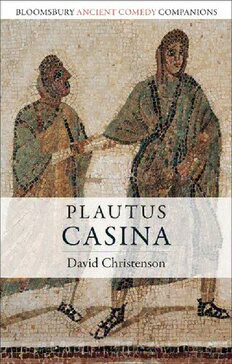
Most books are stored in the elastic cloud where traffic is expensive. For this reason, we have a limit on daily download.
Preview Plautus: Casina
Description:
This is the first volume dedicated to Plautus’ perennially popular comedy Casina that analyses the play for a student audience and assumes no knowledge of Latin. It launches a much-needed new series of books, each discussing a comedy that survives from the ancient world. Four chapters highlight the play’s historical context, themes, performance and reception, including its reflection of recent societal trends in marriage and property ownership by women after the Punic Wars, and its complex dynamics on stage. It is ideal for students, but helpful also for scholars wanting a brief introduction to the play.Casina pits a husband (Lysidamus) and wife (Cleostrata) against each other in a struggle for control of a 16-year-old slave named Casina. Cleostrata cleverly plots to frustrate the efforts of her lascivious elderly husband, staging a cross-dressing ‘marriage’ that culminates in his complete humiliation. The play provides rich insights into relationships within the Roman family. This volume analyses how Casina addresses such issues as women’s status and property rights, the distribution of power within a Roman household, and sexual violence, all within a compellingly meta-comic framework from which Cleostrata emerges as a surprising comic hero. It also examines the play’s enduring popularity and relevance.This volume provides an introduction to Plautus’s Casina, a sophisticated sex farce that premiered ca. 185 BCE. This companion study of Plautus’s comedy analyses the play for a student audience and assumes no knowledge of Latin but will also be of interest to scholars. It launches a new series of books, each treating a comedy that survives from the ancient world. The introductory chapter provides pertinent background about Plautus’s career translating and adapting Greek source plays for Roman stages and audiences. The four remaining chapters highlight the play’s social-historical context and its main themes, offer detailed analysis of the play in performance, and survey Casina’s post-classical reception. Plautus’s comedy pits a lecherous old husband, Lysidamus, against his wife, Cleostrata, in a struggle for control of a teenage female slave named Casina. Cleostrata’s clever, metatheatrical scheme involves staging a cross-dressing faux-marriage that culminates in her husband’s utter defeat. The play provides rich insights into interpersonal relationships within a Roman comic family during the dynamic period of Rome’s history following the Second Punic War. This volume analyzes how Plautus’s play engages with contemporary Roman debates on sexuality, gender, power, and women’s rights, and surveys how adaptions of Casina creatively appropriate these concerns in new theatrical and cultural contexts.
See more
The list of books you might like
Most books are stored in the elastic cloud where traffic is expensive. For this reason, we have a limit on daily download.
